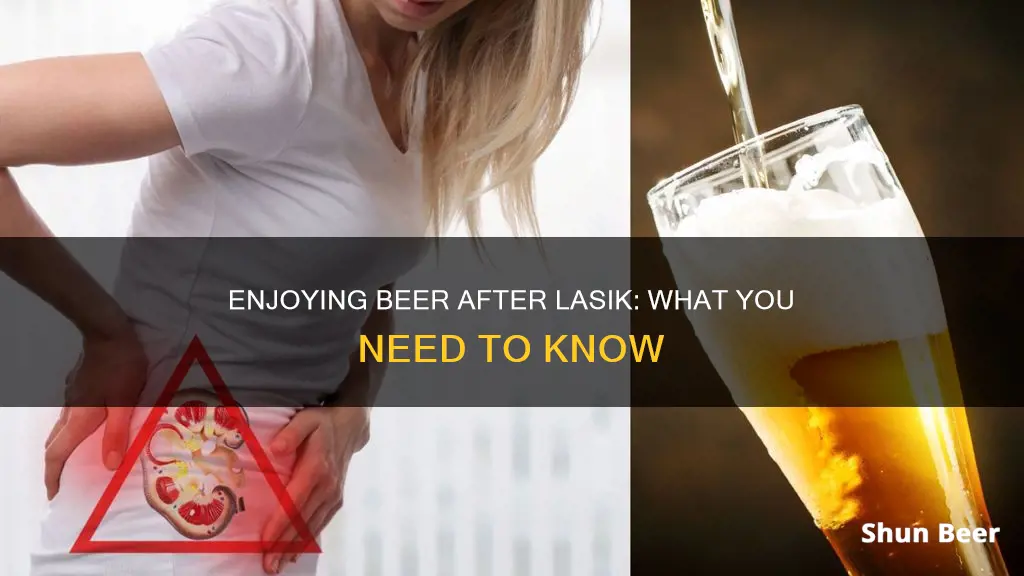
Laser eye surgery is a life-changing procedure for many, but it's important to know what to expect during recovery. One of the most common questions people ask is whether they can enjoy a beer or other alcoholic drinks after their surgery. While it may be tempting to celebrate with a drink, it's important to understand the potential impact on your eyes and overall health.
| Characteristics | Values |
|---|---|
| Time to wait before drinking beer after LASIK surgery | 1-7 days |
| Dehydration | Alcohol has a dehydrating effect on the body, which can worsen dry eyes, a common symptom after laser eye surgery |
| Lowering defences | Alcohol reduces the body's natural resistance to bacteria, increasing the risk of infection after surgery |
| Interfering with medication | Alcohol can stop antibiotics or other medication from working properly, and lead to side-effects such as sickness or dizziness |
| Risk of swelling | Alcohol causes blood vessels in the body to dilate, which can lead to swelling and inflammation after surgery |
| Impaired judgement and coordination | Alcohol impairs judgement and coordination, increasing the risk of accidental injury to the eyes during the recovery period |
What You'll Learn
- Dehydration: Alcohol can dehydrate the body, and eyes specifically, which is essential to avoid after surgery
- Blood thinning: Alcohol can thin the blood, increasing the risk of bleeding during and after surgery
- Interactions with medication: Alcohol can interfere with medication and eye drops
- Impaired immune system: Alcohol can affect the body's ability to heal post-surgery
- Risk of swelling: Alcohol causes blood vessels to dilate, which can lead to swelling and slower recovery

Dehydration: Alcohol can dehydrate the body, and eyes specifically, which is essential to avoid after surgery
Dehydration: Alcohol and the Body
Alcohol is a diuretic, which means it increases the amount of water expelled from the body through urine. This can lead to dehydration, a condition where the body does not have enough water to function properly. Dehydration can affect the entire body, including the eyes, and can have serious consequences if not addressed.
Dehydration and the Eyes
The eyes are particularly susceptible to the effects of dehydration because they are constantly exposed to the environment and require a constant supply of moisture to function properly. When the body is dehydrated, the eyes may become dry, itchy, and irritated. This can lead to a condition known as dry eye syndrome, which can be uncomfortable and even painful.
Alcohol and Laser Eye Surgery
After laser eye surgery, it is crucial to avoid anything that may dehydrate the body and eyes. Alcohol consumption can impede the healing process and make patients uncomfortable during the initial recovery period. Therefore, it is generally recommended that patients refrain from drinking alcohol for at least 24 hours after surgery, and some experts advise abstaining for up to one week. This allows the body to heal and reduces the risk of complications.
Managing Dehydration
To avoid dehydration after laser eye surgery, patients should focus on adequate hydration and follow the eye drop regime provided by their doctor. Drinking plenty of water and non-alcoholic fluids will help to keep the body and eyes hydrated and support the healing process. Additionally, eye drops can help to relieve temporary side effects, such as dry eyes, and aid in the recovery process.
In summary, alcohol consumption after laser eye surgery can lead to dehydration, which may impede the healing process and cause discomfort. It is important to prioritize the body's recovery by staying hydrated and following the recommended eye drop regime. By abstaining from alcohol and focusing on hydration, patients can support their body's natural healing abilities and ensure a smooth recovery process.
Beer and Chest Pain: Is There a Link?
You may want to see also

Blood thinning: Alcohol can thin the blood, increasing the risk of bleeding during and after surgery
Drinking alcohol after undergoing laser eye surgery is generally not recommended, especially within the first 24 hours. However, some sources state that it is acceptable to consume alcohol 24 hours after the procedure.
Blood thinning
Alcohol is known to thin the blood, which can increase the risk of bleeding during and after surgery. Thinned blood may also affect the body's ability to form blood clots, making it challenging to stop bleeding after an injury. This can have serious implications for individuals who consume alcohol before or immediately after surgery. Not only can it make it more difficult to control blood loss during the procedure, but it can also hinder the management of swelling in the postoperative period.
To ensure a smooth recovery and minimise the risk of complications, it is generally recommended to refrain from consuming alcohol for at least 24 hours after laser eye surgery.
Beer Distribution in Georgia: A Complex System Explained
You may want to see also

Interactions with medication: Alcohol can interfere with medication and eye drops
Alcohol can also dehydrate the body, including the eyes. Dry eyes are a common symptom after laser eye surgery, and alcohol consumption can make this worse. Lubricating eye drops will be provided by your eye doctor to relieve dryness, but these can be affected by alcohol consumption.
Drinking Beer with Wired Jaw: Is It Possible?
You may want to see also

Impaired immune system: Alcohol can affect the body's ability to heal post-surgery
Drinking alcohol after LASIK surgery is not recommended, and it's important to refrain from drinking for at least 24 hours post-surgery. While the recovery period for laser eye surgery is typically brief, it is crucial to follow certain guidelines to allow your eyes to heal properly.
Alcohol can affect the body's ability to heal post-surgery by impairing the immune system. Here's how:
Alcohol consumption, especially in excessive amounts, can negatively impact the immune system. Chronic heavy drinking is associated with a decrease in lymphocytes, a vital type of white blood cell for immune function. This decrease in lymphocytes can lead to a higher risk of both bacterial and viral infections. Additionally, alcohol acts as an immunosuppressant, increasing the severity of infections.
The impact of moderate drinking (one glass per day for women and two for men) on viral infections is less clear. However, observational studies suggest that moderate alcohol intake may enhance immune responses compared to abstinence. For example, moderate drinking has been linked to a reduced risk of the common cold in people exposed to rhinoviruses.
Regardless, it is essential to maintain a healthy lifestyle, including regular exercise, a balanced diet, adequate sleep, and avoiding smoking, to keep your immune system strong.
Alcohol can also affect the body's ability to heal by causing dehydration, which can lead to dry eyes and impaired vision. It can interfere with medication, such as antibiotics or painkillers, leading to side effects like nausea, dizziness, or heart and breathing problems. Additionally, alcohol can increase the risk of swelling and slow down recovery.
In the context of LASIK surgery, it is crucial to follow your surgeon's recommendations regarding alcohol consumption to ensure a smooth and safe recovery.
Beer and Klonopin: Safe Mix or Risky Business?
You may want to see also

Risk of swelling: Alcohol causes blood vessels to dilate, which can lead to swelling and slower recovery
Alcohol and LASIK Surgery
While the recovery period after LASIK surgery is typically brief, it is crucial to adhere to specific guidelines to facilitate the healing process. One of the recommendations is to refrain from consuming alcohol for a certain period.
Alcohol consumption can lead to dehydration, which is already a common issue after LASIK surgery. This can cause further discomfort and negatively impact the recovery process. Additionally, alcohol interferes with the body's ability to heal and increases the risk of infection by reducing natural resistance to bacteria.
Another important consideration is the dilating effect of alcohol on blood vessels. When we drink alcohol, the blood vessels in our bodies dilate or expand. While this is typically not an issue, it can lead to swelling and inflammation following surgery. This swelling can slow down the recovery process, increasing the time it takes for your eyes to heal.
To minimise the risk of complications and promote a smooth recovery, it is generally recommended to avoid drinking alcohol for at least 24 hours after LASIK surgery. Some sources suggest extending this period to a few days or even a week. It is important to follow the specific guidelines provided by your surgeon, as they will have the best understanding of your medical history and the details of your procedure.
During the recovery period, it is essential to prioritise your healing by getting adequate sleep and staying hydrated. Following the eye drop regimen provided by your doctor will also help relieve temporary side effects, such as dry eyes.
A Risky Mix: Beer and Benzonatate
You may want to see also
Frequently asked questions
It is generally not recommended to consume alcohol for at least 24 hours after LASIK surgery. Some sources suggest extending this to a week to facilitate the recovery process and ensure the sedative effects from the surgery have worn off.
Alcohol can dehydrate the eyes, making you uncomfortable during the initial recovery period. It can also interfere with any eye drops or medications prescribed during this time. Alcohol also impairs judgment and coordination, increasing the risk of accidental injury to the eyes.
Drinking alcohol can increase the chances of experiencing side effects and complications from the surgery. It can also lead to slower recovery times due to its dehydrating effects and potential interference with medications.
Most sources recommend waiting at least 24 hours after LASIK surgery before consuming alcohol. Some suggest waiting up to a week to ensure the body's healing process can take full effect without interference.
Please note that it is always best to follow the specific guidelines provided by your surgeon, as they will have the best understanding of your medical history and the details of your surgery.







